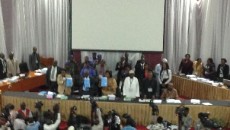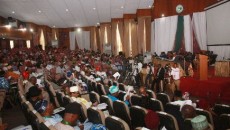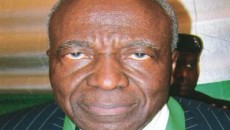Perhaps, the report of on-going National Conference in Abuja would not be complete if it does not take into consideration the voting right and well-being of Nigerians living abroad.
They are found in almost every part of the world. They are equally successful in their callings. But they feel marginalised.
Although their work and businesses have taken them out of the shores of their motherland, they display gargantuan patriotism. They have continued to contribute to the growth of the home economy by remitting $21 billion every year.
They also established businesses that provide jobs for the citizenry.
But despite these contributions, they feel sidelined by their home government. With the ongoing National Conference in Abuja, however, there is a sigh of huge relief as they believe that those challenges would be frontally addressed.
These are Nigerians who reside outside the country. From Europe to America, Asia and the rest of the black world in Africa, they are called Nigerians in diaspora, but they prefer to be addressed as Nigerians living abroad.
This is because, according to them, the diaspora description conveys an impression of alienation from the rest of the compatriots. Admitted that they don’t live in Nigeria, they however said they are full blooded Nigerians and should not be discriminated against in the scheme of things: politics, economy, etc.
There are also a host of other issues that bother them as Nigerians living in foreign countries. The issues include foreign policy that protects them and their businesses, legal and extradition matters, domestication of treaties, universal jurisdiction, Nigeria’s image abroad and the big one, voting right.
These Nigerians are also concerned over inhuman treatments some of their host countries mete out to them without corresponding response from their home country. Though there may be some rotten eggs amongst them, they insist that they are largely worthy ambassadors of Nigeria.
Five minutes with Gambari
When penultimate Thursday, Sunday Vanguard visited the room in Nicon Luxury Hotels in Abuja where the Committee on Foreign Policy and through sub-committees. Matters of the National Conference was sitting, it was clear that the issues were being dissected.
The main committee is chaired by seasoned diplomat and former Minister of External Affairs, Professor Ibrahim Gambari.
In a chat lasting five minutes, Gambari explained what was going in the committee.
He said: “National Conference Committee on Foreign Policy and Diaspora is looking at the issue of Nigeria’s image abroad as well as the issue of the treatment of Nigerians abroad and the contributions that Nigerians abroad can make towards the goals and objectives of foreign policy.
“The committee is giving everybody a chance to say what he feels about foreign policy, how the foreign policy objective of the country has been implemented, what the gaps are and the downside?. And we broke into five sub-committees. The first deals with the concept of foreign policy since the Tafawa Balawa era.
The sub-committee is also looking into the issue of good neighborliness, the concept of non alignment, the concept of African centered approach to our foreign policy, the issue of concentric circles of interest and policies beginning with Nigeria as epicenter in its relationship with neighboring countries, ECOWAS, Africa and the rest of the world. ”
Then you have economic diplomacy as articulated by one of our former foreign ministers, Ike Nwachukwu, and the concept of Middle Powers by Professor Bolaji Akinyimi as well as Ojo Madueke’s concept of citizens diplomacy. So, this sub-committee is looking into it to see how adequate they are for a Nigeria that is changing, an Africa that’s changing and the world that is changing.
“The second sub-committee deals with major issues and challenges including the treatment of Nigerians abroad, the role of the Ministry of Foreign Affairs as a central instrument for our foreign policy, peace keeping. What are the cast and benefits of those activities?
“Then we have another sub-committee which we devoted to legal matters, extradition, domestication of treaties, universal jurisdiction.
“We also have a sub-committee on Nigeria’s participation in international organizations such as ECOWAS, African Union (AU), United Nations (UN) and its agencies, the Commonwealth, OYC, the Gulf of Ginunea Commission and, finally, the diaspora. What are the contributions that they can make? How can they be supported? How can they be facilitated and what kind of structures are to be put in place to get the best from the diaspora.
“Also, the issue of diaspora voting. I am happy to say that the committee is working to bring some consensus. Foreign policies are the fundamentals of a country and that’s why in many countries, foreign policy enjoys bipartisan support because it is not about political parties, not even about the current government but the permanent national interest a country wants to pursue and how does it manipulate the international environment in support of its foreign policy objectives?”
On Nigeria’s image abroad and the treatment meted out to Nigerians, Gambari said, “It wasn’t like that. So we have to ask why. The behaviour of a few among us; rotten apples that corrupt the rest. Secondly, the determination of the government to take Nigerians from unjust and unlawful treatment by whosoever.
This is one of the key challenges we have. We are going to make recommendations because, in international relations, reciprocity is the basis of interaction. So, you treat our citizens as you would want your citizens in your country to be treated, with respect and dignity. And Nigerians wherever they are will have to respect the laws of the land in which they are. They have to be careful that they don’t further compromise the image of our country.”
However, one of the notable figures in the diaspora community from London, United Kingdom who is also a delegate to the conference. Mr. Christain Udechukwu, in an interview, said the perception of Nigeria and Nigerians was on the positive side.
He said: “The perceptions of Nigerians abroad are that we are extraordinary, clever people. We are a people endowed with high level of intelligence and extreme capacity for creativity and this is an energy which those Nigerians who have channeled positively have become global icons.
We have global icons in many, many fields that I cannot even begin to mention now. There are also those who have broken into a whole new world but have not found avenues for their creative talents to be unleashed. They have not had proper guidance and so not have applied their talents and intelligence properly.
There is a whole lot of work going on now by both the state and private individuals to try and hep channel those energies and that is of course through dealing with issues of unemployment and so on because when jobs are created, those creative mind become preoccupied but when jobs are not there, it might become an excuse.”
Voting right
Perhaps, the essential part of the cravings of the diaspora Nigerians hinges most on a right to partake in election processes of their country. They are not happy that with their input to the economy which runs into $21b annually, they still can’t vote in elections like other Nigerians. While the government may still be thinking of ways to achieve this, they have already articulated a mechanism.
The mechanism is to use Nigerian embassies and consulates across the world as voting centers and then push the result to INEC via the internet to collate. Gambari and Udechukwu are very particular on the voting right.
Gambari: “The diaspora, according to the world bank report, are sending as remittances between $12 to $21b annually and that is likely to continue for the next three or four years which is bigger than the foreign aids we are receiving. So, we must find a way to encourage them to continue to invest.
It doesn’t mean that all Nigerians should come home. Those who want to come home should come and the country should facilitate their relocation. But then we should encourage them wherever they may be to continue to excel and to benefit from their expertise.
“We will recommend seriously for voting right because you cannot just take their money and refuse to give them any right in terms of politics. That’s is not right.”
Udechukwu: “What Nigerians abroad crave for are a nation that protects and cares for them as citizens living abroad, that stands up for them against foreign countries or agents of other countries that want to impede their progress.
They want a nation that offers them great opportunities to be the best they can be and contribute the best they can contribute to sustain the future and development of Nigeria.
They want a nation that is fully functional, that defines their role in each development that enables them to access opportunity to contribute in those roles and they seek to have opportunity to actually vote and perhaps, through that external vote which comes from abroad, which is not subjected to a lot of suspicions that surround local election to use that as a way to force politicians to think about their agenda for Nigeria because the patronages and so on that have become entrenched in Nigeria are not evident abroad.
So a politician who is coming to US or London or anywhere else to campaign will think seriously about what he is offering the people. Where a group of Nigerians may have become used to not asking questions, the ones that are living abroad that are used to citizens asking politicians questions and holding them to account will have a different approach. They will ask questions.
They expect politicians who make commitments to fulfill them and deliver on them. And if the don’t, then they will actively work to make sure that those politicians don’t get reelected. So, It is for this reason that a lot of Nigerians abroad are canvassing for diaspora voting because this is their homeland.
Regardless of those who live abroad become Americans or UK citizens, they still Nigeria as their homeland and they want to be able to see that Nigeria has a functional first rate political system. That is what we are craving for.
“Nigerians abroad remit $21 billion annually into the Nigerian economy. As Nigerians living abroad, we show the greatest of confidence in Nigeria by sending that money home every year globally. And that is far greater than any foreign direct investment that comes into Nigeria wether it be in oil and gas.
So with that, when foreigners, the world bank , IMF and all those who keep tab at remittance flows, when they see that Nigerians are remitting $21 billion every year into the economy, they are a bit more careful about what they say because if we have the confidence to invest in our homeland,then there is very little effort that we need to make to ensure that foreigners come in because we are doing it ourselves.”
Bottomline
Gambari is one of the Nigerians who will be sad if eventually the outcome of the National Conference is jettisoned and so, he warned: “We don’t want our report to be a theoretical exercise. I am a professor by training but also a diplomat. So, I feel that what will serve Nigeria better is a report that is not academic but a report enriched by practitioners who live and practice foreign policy everyday.”



